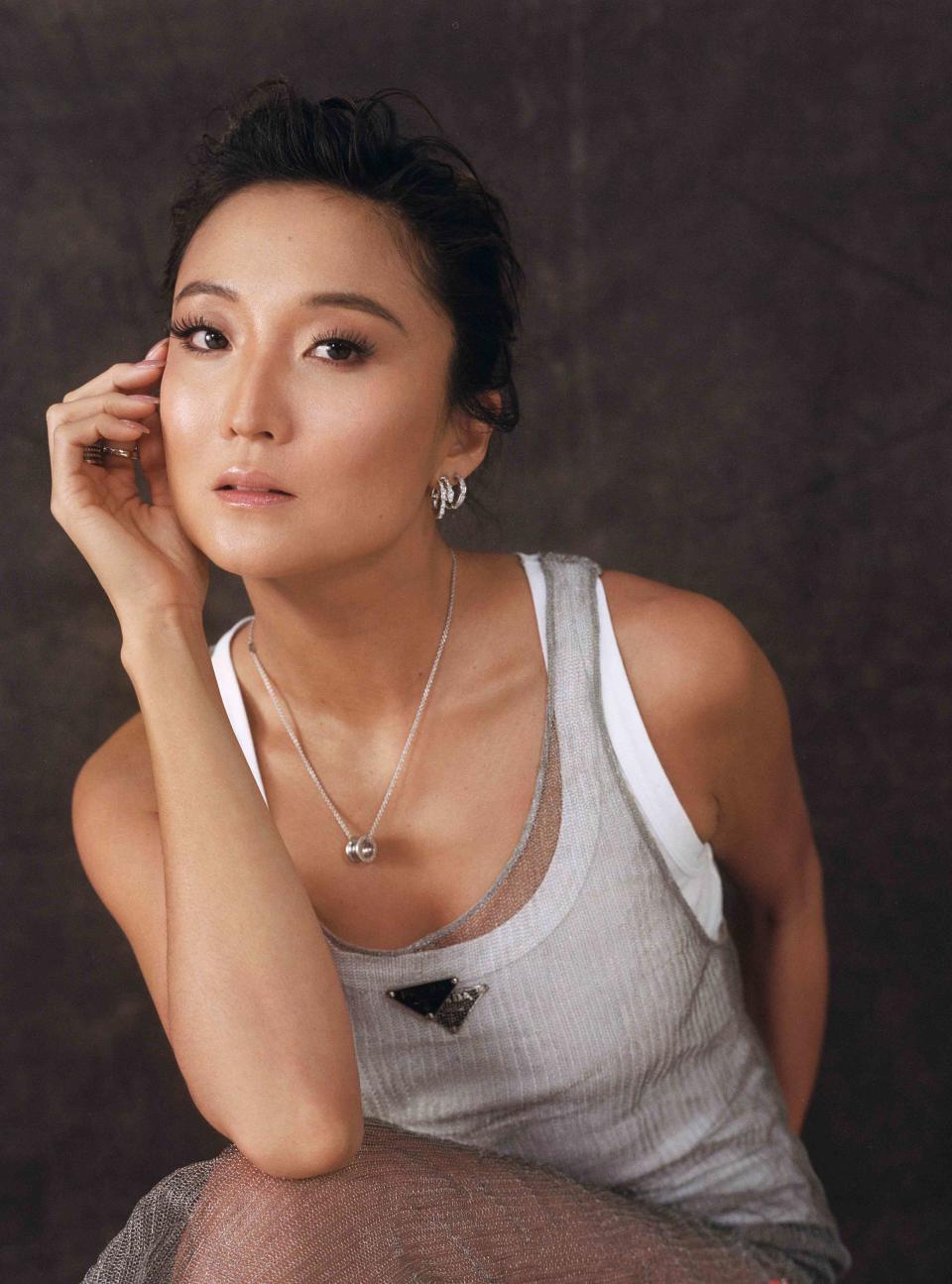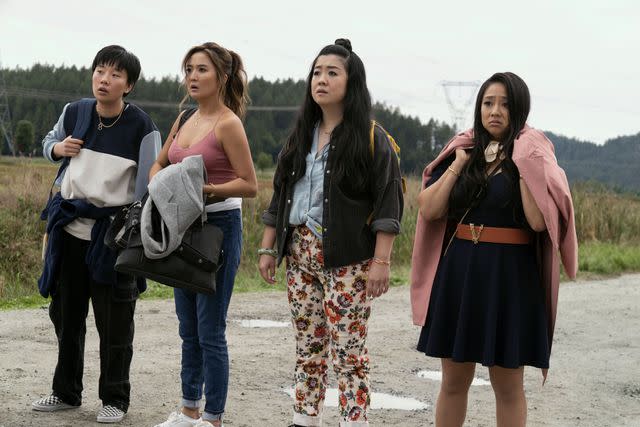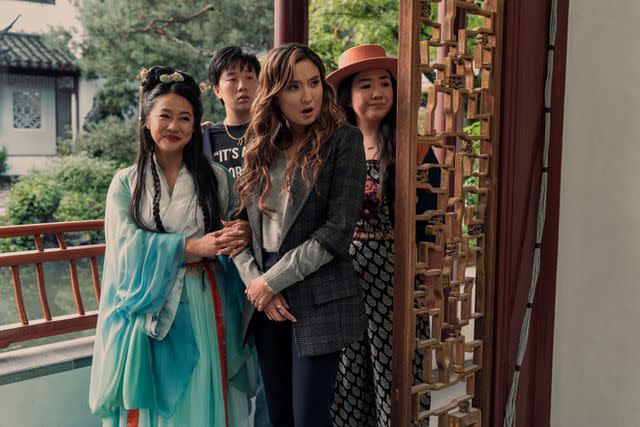Ashley Park Is Finally in the Driver's Seat
With Joy Ride, she's officially putting her quirky-best friend past in the rearview.

Nick Thompson / Trunk Archive
Emily went to Paris, but as soon as she arrived, it was tough for viewers to ignore Ashley Park's Mindy Chen, who managed to steal the spotlight even after the show's titular character transformed herself with those bangs. It wasn't just the musical numbers, the sheer catsuits, or the color-blocked ... everything that let Park shine, but it was also the undeniable charm that she packed into every second of screen time, even though she was technically a supporting character. And when she surprised viewers with a more dramatic role in Netflix's Beef alongside Ali Wong and Steven Yeun, Park was still impossible to ignore, especially with the way she expertly delivered some of the series's most cringe-inducing lines.
"I've spent a decade or more of my career being really, really genuinely so happy to be a supporting character," Park says. "It's so funny when you're given this opportunity, but you've conditioned yourself not to be the lead of your own story. It was such a great growing experience of really giving myself permission to be the lead or the star of this first-of-its-kind movie."
With this summer's highly anticipated Joy Ride, out in theaters on July 7, Park's past as second billing comes to a screeching halt. As Audrey, she effortlessly leads the ensemble cast — including Academy Award-nominated Stephanie Hsu, Good Trouble's Sherry Cola, and comedian Sabrina Wu — as it speeds through what appears to be a The Hangover-style comedy but manages to actually be so much more. "Automatically, I'm like, 'Oh, am I more of a Lolo or a Deadeye or a Kat?' Which is so funny," Park says of her initial reaction to the script and the subsequent disbelief that she was in consideration for the lead role. "And then once some of the stuff is revealed in the script, I was like, 'Wait, are they considering me for the lead of this?'"

Lionsgate
Audrey is adopted by white parents and, being from Washington State, finds herself becoming best friends with the only other Asian girl in town. It's not a narrative that's overly far-fetched. And combining so many layers of fish-out-of-water situations may seem outrageous, but it's actually a very real situation (for one, Park grew up in Ann Arbor, Michigan — not the first place that comes to mind when people think of places with established Asian communities) — something that's not lost on her. Identity crises aren't the same for everyone, but everyone can relate to feeling a little out of place.
"I was like, 'This is a dream come true,'" Park says of making the film, which didn't just include a majority-Asian cast but also a majority-Asian crew. "I didn't even know that it was a dream that I was allowed to have or I had access to. [For] every person who came onto the set, it was just a very, very close and safe feeling — and so fun. Almost every scene felt just like the best of getting together with family for a holiday. A very loud Asian family."
The film, written by the de facto very loud Asian family of Cherry Chevapravatdumrong, Teresa Hsiao, and Adele Lim, plays on Asian stereotypes. Audrey is a very successful lawyer and at one very poignant part of the film, a character ticks off the laundry list of aspirational vocations, including doctor and lawyer. But because the film is so clearly written by Asian people (though there's something for every viewer, rest assured), the jokes land with a laugh and not an eye roll. It's 2023. We've gotten a blockbuster Asian-led rom-com with 2018's Crazy Rich Asians, everyone championed the Asian-led sci-fi masterpiece Everything Everywhere All at Once, and now, Park and Co. are here to show that there's plenty of room for an Asian-led (and directed and written) raunchy comedy. And the emphasis really is on raunch, which adds just another layer of representation. Asian characters are often seen as straight-laced good girls, and in Joy Ride, there's space for even the most demure women to let loose, to say the very least.
"What's fun about this is Teresa and Cherry and Adele, and especially our writers, they're just so smart about how to be very witty in their humor. It's not just raunchy, gross humor. It's thought through," Park explains.
The film's R rating is very much earned thanks to physical comedy, visual gags, and not-so-subtle references to just about every body part. But the film's humor isn't solely rooted in raunch. Asian stereotypes, often seen as the punchline when they make an appearance, get thrown for a loop in Joy Ride, something that Park says she pays close attention to.
"It's always been interesting for me to be diligent about breaking those stereotypes," she explains. "An Asian can be smart just because they're smart, not because they're Asian." The crew was open to Park and the rest of the cast adding their own experiences with stereotypes into the film, and she explains that adding some of what she'd felt into the role of Audrey felt natural.
"We got to collaborate a lot with them and say, 'Oh, what if we do this? Or what if we do that?' And a lot of the heartfelt parts about Asian stereotypes that I say came from stuff that I had [brought] to the table," she says.
Park refers to her experience with Joy Ride as her journey of self-discovery professionally and personally. "I mean, it's the first time I've been number one on a call sheet, and it's an opportunity that I've been very ready to do, but I'm so glad it happened when it did," she notes. Park realized that she'd been harboring a few not-so-great views of her Asian identity, but she shared that when she was in a place where she could celebrate all parts of it, things seemed to emerge that she didn't expect.

Lionsgate
Park says she's heard the stereotype, "Oh, you're basically white," several times over the years — another parallel between Ashley and on-screen Audrey. "And I think that that is something I was so proud to hear years ago. Now, especially in being in this environment with these people, I was like, 'Oh, that's not a great thing. I am my identity, as well.'"
Identity is at the core of Joy Ride, between the K-pop references, the slapstick, and the friendship. But it's about more than just being Asian or Asian American. The film tackles gender and sexual orientation as well. To Park, that's simply a mirror to reality. It's not any sort of profound effort toward anything more than depicting what's around each and every one of us.
"It reflects what the world is. We can't deny the people we are and the people that surround us. I think it's incredibly important," she says about showing diversity on multiple levels. "The whole point of movies is so people can feel a little bit less alone, see themselves reflected, and be like, 'Oh, I recognize this;' to have a lot of inclusion in what we see and the stories that we tell so that everyone can see, 'Oh, I'm actually very similar,' or, 'I feel those things too,' or, 'I see those things too.'"
Making sure that people see "those things" is Park's M.O., though she's aware of her place in the conversation — and honored to even be a part of it. Unlike many of her peers, speaking on representation is part and parcel of each and every project she signs on to, but she knows that and understands what it means to people not unlike herself — people who weren't even quite sure what their dreams could be until recently.
"To be in the role of a role model … or [someone] who's breaking down barriers, I almost felt like I didn't deserve it at first, a few years back. Because I was like, 'Oh, but I'm just doing my work,'" she says. "I'm not educated on how to lead this sort of thing in any sort of way and be a boundary-breaker in any way. Then, I realized that there's a responsibility now, being in the public eye … to really honor the fact that it allows people to see themselves in ways or in characters or in situations that they never really saw themselves in. For me, that's just the best."
Lead photo: Nick Thompson / Trunk Archive.
For more InStyle news, make sure to sign up for our newsletter!
Read the original article on InStyle.


